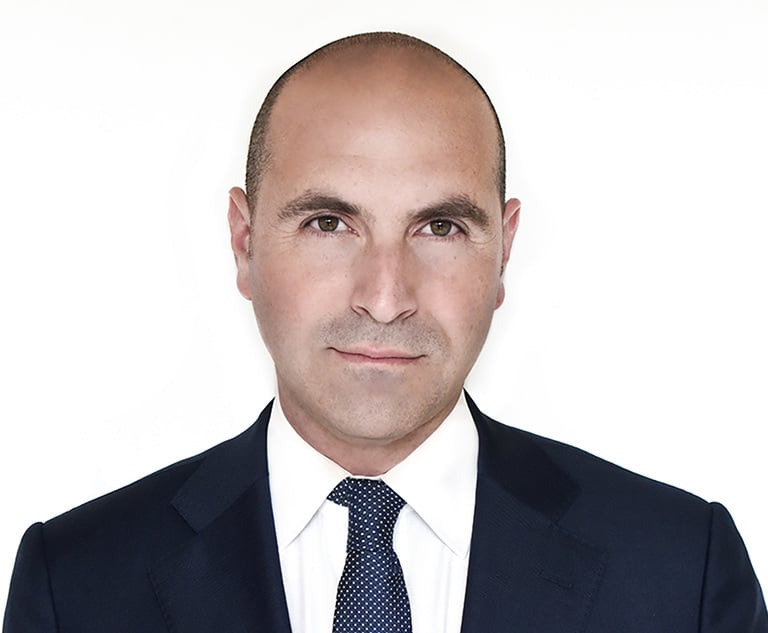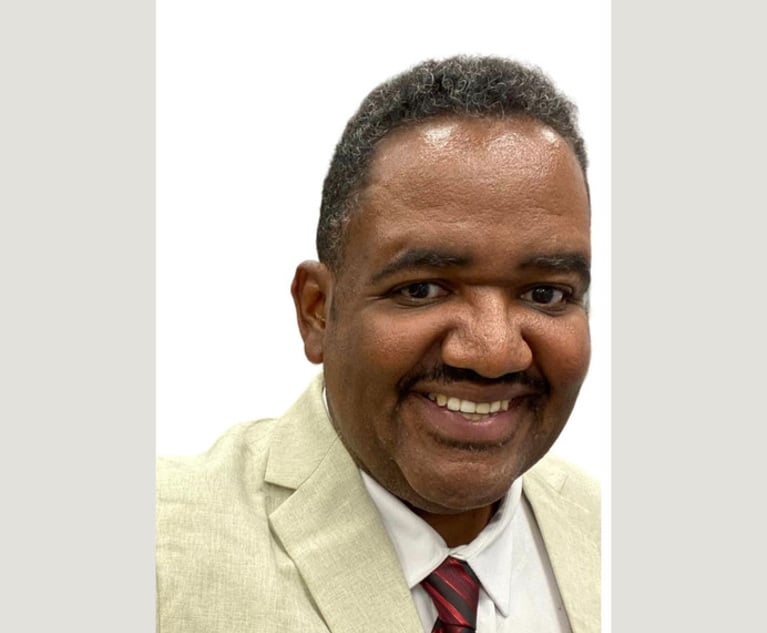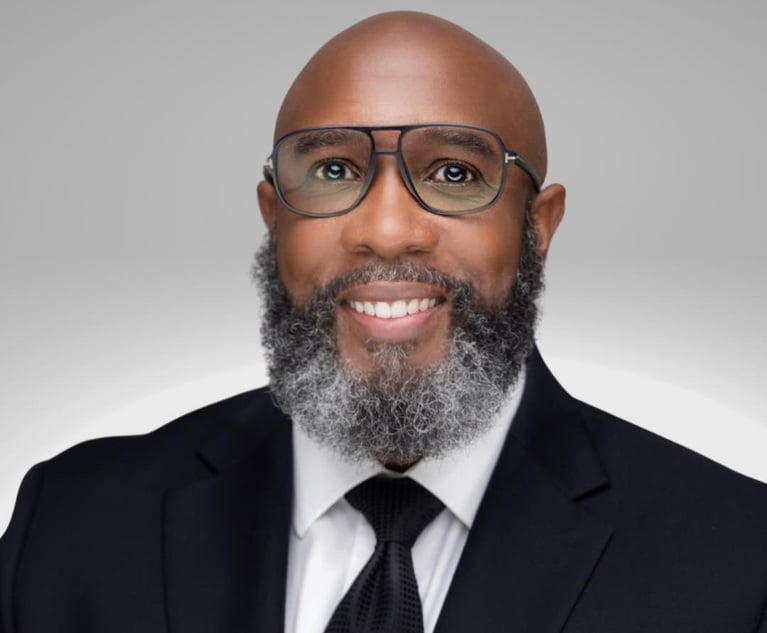How Phil Stein Keeps a Cool Head in High-Stakes Complex Corporate Finance
Stein, a partner and litigation practice group leader with Bilzin Sumberg, honed his reputation in the wave of Great Recession-related litigation.
October 26, 2018 at 12:34 PM
6 minute read
 Phil Stein, with Bilzin Sumberg. Courtesy photo
Phil Stein, with Bilzin Sumberg. Courtesy photo
Ten years onward from the Great Recession, people are growing nervous again. October 2018 was particularly rife with talk of calamity, as shares repeatedly dropped and markets reliably tumbled. In a time of normalized volatility — whether political or financial — conversations concerning the future often pose the question: When is it going to come crashing down?
According to Phil Stein, there are a number of ways an institutional corporate crisis might rear its ugly head once more.
“It could just be a reversion to what was going on with respect to the last financial crisis,” the Bilzin Sumberg litigation practice group leader said. “We're not literally doing the same things with deregulation … but there's more going on now that is not exactly conservative than was going on five, six, seven years ago in terms of trading activity and the like.”
Noting that there's no reason why the troubles of 2018 would resemble those of 2008, Stein added that the technological and cultural changes of the last decade — with an increase in data breaches and corporate hacking, as well as the creation of cryptocurrency being among them — further shroud an already erratic occurrence.
“I think that's part of why everyone is so concerned about data security, privacy issues and trying to do everything they can to prevent an onslaught of further hacking,” he said. “It's bad enough obviously when major retailers or other companies are hacked. What about if the financial markets themselves get hacked? And what would it mean for us if our markets were really disrupted because of that?”
Although he claims to have “no insight into which will be the one that causes the next set of headaches,” Stein has accrued a considerable degree of experience navigating complex legal questions during times of institutional crisis. As a financial services litigator, the Bilzin Sumberg partner spent much of the Great Recession's wake defending clients from a broadside of buyback demands as well as indemnification for mortgage loans.
“What seemed to be the case was that this new phenomenon was developing — almost a culture of resignation, a real kind of defeatism with respect to these demands,” Stein recounted. He recalled his clients, which have included “virtually all the major home builders that have affiliated mortgage companies and a number of regional banks,” repeatedly asking themselves: “How can we possibly do anything about this?”
“The contracts were often pretty one-sided pursuant to the loans which they had sold these bigger banks,” he explained. “One of the things that I was able to do was to point out to clients … was that we're still talking about the fundamentals of breach of contract claims and indemnification claims. There are all sorts of things that would need to be proven and all sorts of defenses available to them.”
Stein has encouraged his clients to be more proactive in their post-Great Recession agreements and draft contracts that better insulate them from litigation.
“And often what we found, by the way, is that the problems are vastly overstated,” he said. “It's easy now with the benefit of hindsight to try to portray companies that were making loans as having just been really wild and reckless, because everyone now buys into this narrative that there were so many bad loans out there. And while there were a lot of bad loans out there, I can honestly say with respect to my clients that time and time again what we find is that they did exactly what they were being asked to do.”
In the ensuing years, Stein has built lasting relationships with his clients from the foundation of his recession-related legal work.
“The key to me, and the nice thing for our firm, is that we've really been able to expand the relationships and branch out from that beginning and do a lot more in the financial services area,” Stein said.
Additionally, Stein has expanded his practice to include digital security and privacy matters. He believes that one of the most daunting issues facing businesses as it relates to data management is compliance with sometimes conflicting regulatory guidelines.
“A real headache for businesses now is they've got to be aware of everything that's out there,” Stein said. “One of the things that we work with clients a lot on is trying to ensure that there is a sufficient paper trail documenting a board and senior management's attention to the need to protect data appropriately, making sure that a compliance officer is on board, that the compliance officer's work is being vetted, that there are minutes in board meetings.”
Ultimately, Stein feels well-equipped to tackle the challenges that may come his or his client's way. Discussing a speech he gave before the Mortgage Banker's Association in 2010 to discuss repurchase demands and indemnification claims, it would seem that Stein — for better or worse — has been the right man for unfortunate circumstances.
“I had a situation that I never had before — and I'm sure I will never have for the rest of my career — which was a room full of people just really, really concerned about this issue,” Stein said. He called it a “strange situation” to conclude a presentation only to have “prospective clients lining up to give me their business cards.”
He said, “It just really showed that I was in the right place at the right time with respect to an issue that was of tremendous concern.”
Phil Stein
Born: August 1967, Durham, North Carolina
Spouse: Michelle Stein
Children: Chloe, Dina
Education: Duke University School of Law, J.D., 1993; University of North Carolina, B.A., 1989
Experience: Partner, Bilzin Sumberg, 2008-present; Principal, Kramon & Graham, P.A., 2007-2008; Partner, Snyder Slutkin Snyder, 2005-2007; Partner, Alston & Bird, 2000-2005 (Associate, 1994-2000); Associate, Skadden, Arps, Slate, Meagher & Flom 1993-1994.
This content has been archived. It is available through our partners, LexisNexis® and Bloomberg Law.
To view this content, please continue to their sites.
Not a Lexis Subscriber?
Subscribe Now
Not a Bloomberg Law Subscriber?
Subscribe Now
NOT FOR REPRINT
© 2025 ALM Global, LLC, All Rights Reserved. Request academic re-use from www.copyright.com. All other uses, submit a request to [email protected]. For more information visit Asset & Logo Licensing.
You Might Like
View All
Growing Referral Network, Alternative Fees Have This Ex-Big Law’s Atty’s Bankruptcy Practice Soaring
5 minute read
Against the Odds: Voters Elect Woody Clermont to the Broward Judicial Bench
4 minute read
Miami Civil Judge Myriam Lehr to Say Goodbye to the County Court Bench
4 minute readTrending Stories
- 1Attorneys ‘On the Move’: O’Melveny Hires Former NBA Vice President; MoFo Adds Venture Capital Partner
- 2'Skin in the Game': Lawyers Call for Pressure After American Airlines Crash
- 3Apple Files Appeal to DC Circuit Aiming to Intervene in Google Search Monopoly Case
- 4A Plan Is Brewing to Limit Big-Dollar Suits in Georgia—and Lawyers Have Mixed Feelings
- 5Startup Bringing AI to Doctors' Offices Hires First GC
Who Got The Work
J. Brugh Lower of Gibbons has entered an appearance for industrial equipment supplier Devco Corporation in a pending trademark infringement lawsuit. The suit, accusing the defendant of selling knock-off Graco products, was filed Dec. 18 in New Jersey District Court by Rivkin Radler on behalf of Graco Inc. and Graco Minnesota. The case, assigned to U.S. District Judge Zahid N. Quraishi, is 3:24-cv-11294, Graco Inc. et al v. Devco Corporation.
Who Got The Work
Rebecca Maller-Stein and Kent A. Yalowitz of Arnold & Porter Kaye Scholer have entered their appearances for Hanaco Venture Capital and its executives, Lior Prosor and David Frankel, in a pending securities lawsuit. The action, filed on Dec. 24 in New York Southern District Court by Zell, Aron & Co. on behalf of Goldeneye Advisors, accuses the defendants of negligently and fraudulently managing the plaintiff's $1 million investment. The case, assigned to U.S. District Judge Vernon S. Broderick, is 1:24-cv-09918, Goldeneye Advisors, LLC v. Hanaco Venture Capital, Ltd. et al.
Who Got The Work
Attorneys from A&O Shearman has stepped in as defense counsel for Toronto-Dominion Bank and other defendants in a pending securities class action. The suit, filed Dec. 11 in New York Southern District Court by Bleichmar Fonti & Auld, accuses the defendants of concealing the bank's 'pervasive' deficiencies in regards to its compliance with the Bank Secrecy Act and the quality of its anti-money laundering controls. The case, assigned to U.S. District Judge Arun Subramanian, is 1:24-cv-09445, Gonzalez v. The Toronto-Dominion Bank et al.
Who Got The Work
Crown Castle International, a Pennsylvania company providing shared communications infrastructure, has turned to Luke D. Wolf of Gordon Rees Scully Mansukhani to fend off a pending breach-of-contract lawsuit. The court action, filed Nov. 25 in Michigan Eastern District Court by Hooper Hathaway PC on behalf of The Town Residences LLC, accuses Crown Castle of failing to transfer approximately $30,000 in utility payments from T-Mobile in breach of a roof-top lease and assignment agreement. The case, assigned to U.S. District Judge Susan K. Declercq, is 2:24-cv-13131, The Town Residences LLC v. T-Mobile US, Inc. et al.
Who Got The Work
Wilfred P. Coronato and Daniel M. Schwartz of McCarter & English have stepped in as defense counsel to Electrolux Home Products Inc. in a pending product liability lawsuit. The court action, filed Nov. 26 in New York Eastern District Court by Poulos Lopiccolo PC and Nagel Rice LLP on behalf of David Stern, alleges that the defendant's refrigerators’ drawers and shelving repeatedly break and fall apart within months after purchase. The case, assigned to U.S. District Judge Joan M. Azrack, is 2:24-cv-08204, Stern v. Electrolux Home Products, Inc.
Featured Firms
Law Offices of Gary Martin Hays & Associates, P.C.
(470) 294-1674
Law Offices of Mark E. Salomone
(857) 444-6468
Smith & Hassler
(713) 739-1250







